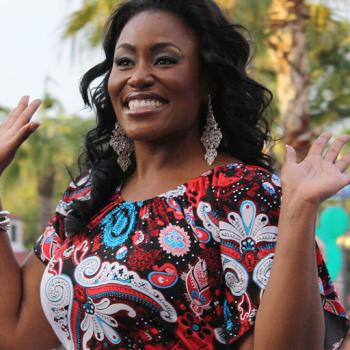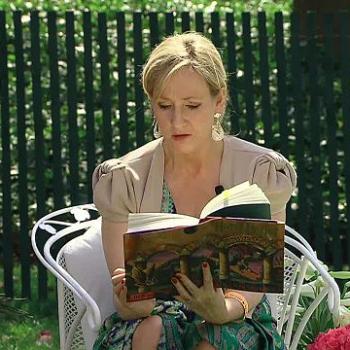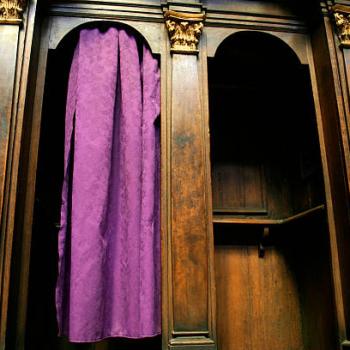
Words fail to express how tragic it has been to watch the complete capitulation of old-guard evangelicalism to the giant con that is Donald Trump’s candidacy. Words do not fail me when I think about how disgusting it is that Trump doesn’t even have to pretend to give a damn about the things evangelicals hold dear. But I’m trying to keep this PG-rated here. (Meanwhile, I notice that he finally paused to acknowledge SCOTUS’s disastrous abortion ruling with the astute observation that if Scalia were still alive, the vote would have been 5-3 “the opposite way.” Oh, wait, actually, we would still have lost 5-4, never mind. But don’t worry, I’m sure Trump will hire the best people to do math for him once he’s elected President.)
The latest and most painful development in this slow-motion train-wreck is James Dobson’s choice to join Trump’s religious “advisory” board, while simultaneously spreading what he later clarified was only a second-hand rumor that Trump had “accepted Christ.” The real kicker? The person who some people say they heard from their cousin’s sister-in-law’s aunt might have led Trump to Christ is (drumroll please) Paula White.
So yeah, if you need me, I’ll be under all my blankets sobbing in a fetal curl. Wake me up when Jesus comes back.
What’s that you say? I can’t just hide in bed until the apocalypse? What, are you gonna tell me the death of the religious right does not equal the death of the church, or something?
I should have known.
This election year has been a ghastly mix of sad and disgusting. There are some things about it that I just find disgusting. I never cared about or respected Jerry Falwell the Lesser, so to see him pose with the Donald plus special guest appearance by Playboy Magazine wrung no tears from my eyes.
The sadness hits me when I think about the people for whom I still held out some hope that they wouldn’t bow to the beast. James Dobson was one of the last old-guard evangelical leaders whom I really admired and followed. I disliked how his stepping down from Focus on the Family was handled, and I could never shake the suspicion that he was “nudged” out to make way for the more centrist Jim Daly. Furthermore, it gave me hope that unlike Mike Huckabee, Jerry Falwell Jr. and friends, Dobson didn’t immediately hop onto the Trump train, choosing to endorse Ted Cruz instead. He specifically expressed concern about Trump’s wishy-washiness on Planned Parenthood and the gay “marriage” issue, and he stressed the importance of electing a Constitutional conservative who would nominate solid SCOTUS replacements. “Finally,” I thought, “a respected Religious Right voice who’s still resisting the invasion of the body-snatchers.”
Well, that didn’t last. Even after walking back his claim to have new information on Trump’s alleged conversion to Christianity, Dobson is still out there saying that Trump “appears to be tender to the things of the Spirit.” Excuse me while I go violently bash my head in on the nearest desk, followed by stabbing my eye out with a fork.
Dobson wasn’t the only leader for whom I held out hope. I was also glad to see Franklin Graham holding back and hesitating to endorse. He even criticized Trump for flaking out on North Carolina’s bathroom bill. At worst, I thought he might wind up being a “hold-the-nose” Trump voter.
Yet, there was Franklin Graham at the closed-door meeting of “faith leaders,” trying his darnedest to compare Trump to Old Testament figures who were less than sinless. (Because Trump has repented in sackcloth and ashes and publicly expressed his desire to love and serve God, just like David. Oh wait, Graham couldn’t say that because that never happened.) He then wrote a summary of the day that was technically nothing more than a factual report, but you could tell that he was putting far more weight on what Trump said than he should have. For example, Trump mouthed the usual blah-blah about SCOTUS, “which,” writes Graham, “is incredibly important for the future of our nation.” Well yeah, like anybody is denying that, but the question is not whether this is a big deal. The question is whether Trump means a word he says. Graham has yet to endorse Trump officially, but at this point, it’s pretty clearly a question of when, not if.
What all of this comes down to is that the Religious Right qua bastion-of-political-conservatism-on-which-Christians-can-rely-to-be-sensible… is dead. So, who are we left with? I never thought I’d say this, but we appear to be left with Russell Moore.
For folks who don’t follow church leadership turnover, Russell Moore has been the face of the Southern Baptist church for the last three years, replacing Richard Land as head of the Ethics and Religious Liberty Commission. (Land was another of the names to appear on Trump’s new religious advisory board.) While Moore articulates orthodox theology and considers himself a political conservative, he’s also made a point of lecturing Religious Right voters in a rather patronizing tone. He likes to ruffle conservative feathers on issues pertaining to Islam, race, and other kinds of “social justice,” often adopting a “pox on both your houses” approach in his political commentary. In an interview with Phil Vischer, he’s spoken negatively about the rise of the Religious Right in the 80s, saying that it was a “moralistic” movement that ultimately did more harm than good.
Naturally, the Trump candidacy has only added fuel to Moore’s fire. In his mind, everything is connected to everything. The fevered, unthinking celebrity worship of Trump is connected to the old-guard evangelical’s obsession with getting the right political leaders into power, which all stems from a failure to trust God and understand the gospel properly.
This kind of thinking has irritated me for a long time, because I simply disagree that these strands are all inextricably connected. To a great extent, I believe that Moore is mistaking his own personal political hang-ups for some kind of Grand Unifying Theory about American Evangelicalism. On the other hand, I want to be fair: There’s a grain of truth to what he’s saying. That grain of truth is that too many otherwise sensible evangelical leaders suffer from what is known in the world of show biz as FOMO: Fear of Missing Out.
You see, it’s not that difficult for somebody like Russell Moore to check out of an election, because he’s not the culture warrior type. But for someone who is that type, it takes a near superhuman effort to admit that there’s nothing left to fight for, politically speaking. It’s heart-wrenching to say soberly, “We have no guy. There’s nothing here. Go home.” That’s why guys like James Dobson and Franklin Graham are twisting themselves into pretzels to find something good to say about Donald Trump. They’re not sell-outs. They’re just displaying tragically poor judgement, born of a misplaced desire to be involved in helping their country on a national scale.
If James Dobson is the face of conservative evangelicalism’s past, Russell Moore is the face of conservative evangelicalism’s future. In some ways, we could see this as a good thing. The new conservative evangelicalism is less gullible, less prone to group-think and click-bait, and less prone to obsess over a single issue like immigration. Moore’s own preferred candidate was Marco Rubio, and while I still threw my weight behind Ted Cruz, I was not pleased with the nastiness and schadenfreude that some Christian right voters showed at Rubio’s fall. This stemmed almost exclusively from bitterness over his role in the Gang of 8, which I was no fan of either. Still, Rubio was an articulate, decent guy and a solid social conservative who could spot Donald Trump about 50 IQ points. Yet many evangelical Trump voters were so fixated on immigration that they overlooked all of these things, ironically voting for someone who never even put forward a coherent immigration plan of his own. All he had to do was spout some catch-phrases, and they were hooked.
Of course, it can fairly be pointed out that Moore doesn’t obsess over the single issue of immigration because he’s a lefty on immigration. True enough. I’m not advocating that anybody become a lefty on immigration, race relations, or any of the other bees Moore has in his bonnet. What I propose for conservative evangelicals going forward is a third way, between the sad gullibility of the old guard and the sometimes smug quietism of the new.
The third-way conservative evangelical is a hard-nosed, card-carrying member of the Vast Right-Wing Conspiracy, to the bone. You can’t guilt-trip him by wagging your finger under his nose. You can’t wheedle him into modifying his “tone,” going out of his way to be “sensitive” to certain mascot groups, or making sure he talks just as much about x issue as he does about y issue. At the same time, you can’t pull the wool over his eyes with empty promises. You can’t fast-talk him into buying a bottle of snake oil with a ‘Murrca label slapped onto it. You can’t elicit a Pavlovian reaction from him with cliched soundbites like “When I’m President, we’re all gonna be saying Merry Christmas again!” He’s pessimistic enough to know better.
There’s no prominent theological leader like Russell Moore whom we can claim as the model exemplar of the third way. But that doesn’t mean there’s nobody out there articulating it. Some examples include political pundit Matt Walsh, homeschooling pioneer Michael Farris, and, of course, most conspicuously, Senator Cruz. As the scythe of Election Year 2016 cuts through the evangelical voting bloc, they represent the small minority of misfits who have learned their lessons from watching the old guard fall, yet refuse to pledge total allegiance to the new. We are the bearers of the tragic vision. We recognize what has been lost, but we mourn it, unlike Russell Moore, who bids it good riddance.
So here we stand at the grave-site, we few, we band of mourners. We come not to bury the Religious Right, but to praise it. We come not to dismiss its legacy, but to honor it. And when we leave, we will carry it with us.
The Religious Right is dead. Long live the Religious Right.












